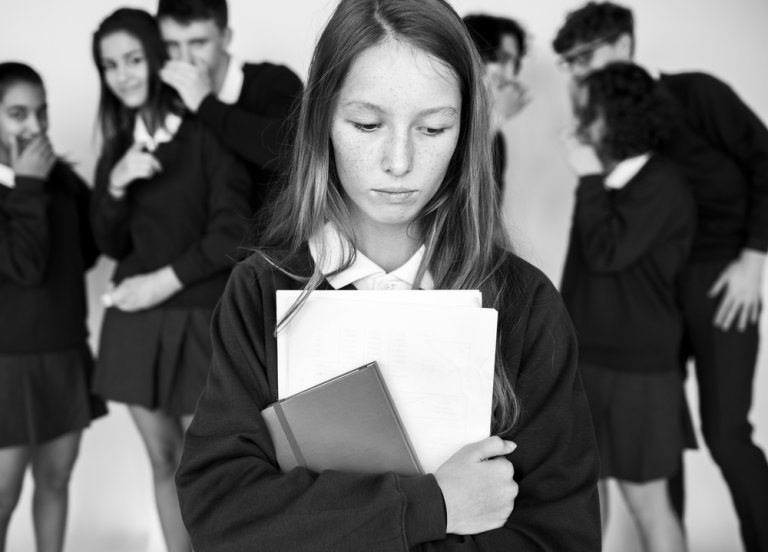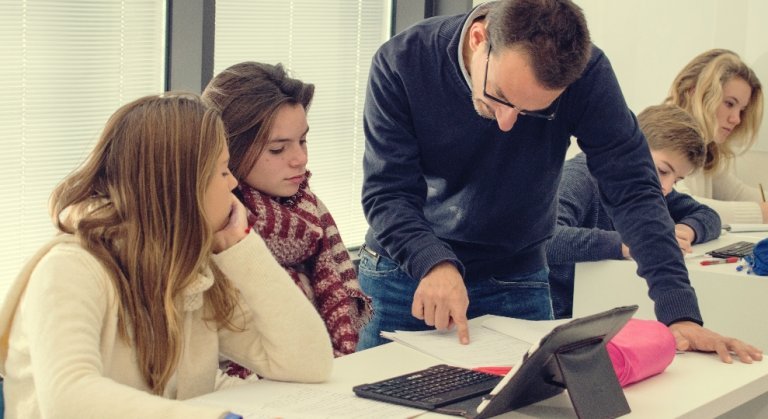Listen Up, Teachers! It's Not All About The Syllabus!

Surely we’ve all had teachers who manage to antagonize and get into arguments with their students. It’s an attitude that leaves much to be desired, and they often seem to act just like the students they’re supposed to be teaching. On the other hand, there are those who enter the classroom and just read from a book without explaining a thing. Others always seem to be in a hurry because they say there won’t be time to cover everything.
The dynamics are the same. Some get on better with the students, others get on worse. But their only aim seems to be just to teach the syllabus, give excessive attention to the grades (the higher the better), and send copious amounts of homework in the hope the students might gain some knowledge and learn something. Isn’t there something missing in all of this?
“If you tell me, I’ll forget it, if you show me I’ll remember it, and if you involve me I’ll learn it”.
The syllabus isn’t the only important thing
Many teachers’ only desire is to teach the syllabus, meet all the objectives, and finish the book. All they achieve with this is to destroy the creativity of the young people. Far from learning, all the students do is try and memorize as much information as they possibly can. And what usually happens is that the following month or week they’ve forgotten nearly all of it.
This is something that many teachers complain about. However, few of them actually bother to analyze whether their way of doing things is the right one. They put too much emphasis on grades, and give little empathy to the student, especially the teenagers. The importance of the positive influence the teacher should have on their pupils is hardly ever thought about.

It seems that as soon as they enter the classroom, some teachers forget the most human part of their job. This is especially the case if they’re dealing with teenagers. It isn’t uncommon that when reports of bullying or harassment come up, the teachers can’t believe it and say that they hadn’t noticed anything. Hardly surprising when they treat their job and their students with such indifference.
The best teacher ever
However, even though many teachers don’t convey any passion or inspiration to the students, there are some that do. Here’s a fragment from a man called Carlos Arroyo, who wrote an article in the Spanish newspaper El País on August 17, 2013:
“The best teacher of my life was Don Manuel Bello. He was my Literature teacher in my 5th year of High School […]. He made me love reading and studying. In an almost suffocating environment with little teaching, as that school was at that time, in which there were many who aspired to be teachers, but weren’t… this teacher, in an amazingly natural way, was able to motivate me to read and study.”
A student can start off loving math and end up hating them, depending on the teacher they have. Another may never achieve his passion of becoming a writer because he had a literature teacher who was very negative about his work. It’s clear that teachers influence the self-esteem of their students.
Teachers can change their students
Just as the choice of a positive or negative criticism influences the behavior of children at home, the same thing happens in the classroom. If a teacher doesn’t believe in his students, if he isn’t able to motivate them, then it’s clear that the situation will not improve on its own. It’s no use complaining. The teacher has a power that he either doesn’t want to use or that he doesn’t know about.

I can confirm all of this based on my own personal experience. Not only have I been a student (something that many teachers forget) but I have also had work experience as a teacher in secondary education. I have seen my own tutor alienate his students with the following words: “There’s no point doing anything with him, he doesn’t even open his book”.
My tutor only saw rebellious teenagers, some better than others, but the vast majority clueless and “little brats”. That vision didn’t coincide at all with my own. Without having gotten to know them all, I could see how most of them felt insecure, unmotivated, and lacking in self-esteem. Without needing to even ask them, you could suppose that they probably had problems in their home life.
Interestingly, when I took charge of that class for 2 months, the boy who never opened his book did so. I never ignored him, and certainly never spoke badly of him. I never ordered him to do something he didn’t want to do. Quite simply, something just happened.
The way I took the classes and the passion I transmitted had its effect. Students even wanted to come to the front of the class and speak in front of others. The student in question saw how his classmates were so at ease doing their work. And so, one day, all of his own volition, he opened his book, took his pen, and did what I had asked the class to do: an essay.
Everything is possible
My tutor was open-mouthed. He said that I had achieved the impossible. My only thoughts were with that boy though, and his writing clearly showed what I had suspected all along: he lived in a dysfunctional family. Unfortunately, I couldn’t continue teaching there. However, I learned through all of this that the teacher has the power to change the attitude of the student.
“The mediocre teacher talks. The good teacher explains. The excellent professor demonstrates. The truly great teacher inspires.”
– William A. Ward-
My tutor told me that allowing the students to go to the board and doing some exercises in groups was a positive thing. But he also said that, in the long run, it took away from the time needed to complete the syllabus. This made me ask myself the question: what’s more important? For the student to learn by having fun, and themselves in front of their classmates? Or to simply finish the syllabus (very little of which they will remember) and stifle their creativity?

We need big changes in the classroom. There are already some schools that implement the Montessori method or others such as the Sadako school in Barcelona, which has no individual desks, and is based on collaborative learning and emotional, social, and philosophical education… Most schools, however, are still governed by the traditional model. A model that doesn’t work for everyone. Because although the syllabus is important, it certainly isn’t everything.
Surely we’ve all had teachers who manage to antagonize and get into arguments with their students. It’s an attitude that leaves much to be desired, and they often seem to act just like the students they’re supposed to be teaching. On the other hand, there are those who enter the classroom and just read from a book without explaining a thing. Others always seem to be in a hurry because they say there won’t be time to cover everything.
The dynamics are the same. Some get on better with the students, others get on worse. But their only aim seems to be just to teach the syllabus, give excessive attention to the grades (the higher the better), and send copious amounts of homework in the hope the students might gain some knowledge and learn something. Isn’t there something missing in all of this?
“If you tell me, I’ll forget it, if you show me I’ll remember it, and if you involve me I’ll learn it”.
The syllabus isn’t the only important thing
Many teachers’ only desire is to teach the syllabus, meet all the objectives, and finish the book. All they achieve with this is to destroy the creativity of the young people. Far from learning, all the students do is try and memorize as much information as they possibly can. And what usually happens is that the following month or week they’ve forgotten nearly all of it.
This is something that many teachers complain about. However, few of them actually bother to analyze whether their way of doing things is the right one. They put too much emphasis on grades, and give little empathy to the student, especially the teenagers. The importance of the positive influence the teacher should have on their pupils is hardly ever thought about.

It seems that as soon as they enter the classroom, some teachers forget the most human part of their job. This is especially the case if they’re dealing with teenagers. It isn’t uncommon that when reports of bullying or harassment come up, the teachers can’t believe it and say that they hadn’t noticed anything. Hardly surprising when they treat their job and their students with such indifference.
The best teacher ever
However, even though many teachers don’t convey any passion or inspiration to the students, there are some that do. Here’s a fragment from a man called Carlos Arroyo, who wrote an article in the Spanish newspaper El País on August 17, 2013:
“The best teacher of my life was Don Manuel Bello. He was my Literature teacher in my 5th year of High School […]. He made me love reading and studying. In an almost suffocating environment with little teaching, as that school was at that time, in which there were many who aspired to be teachers, but weren’t… this teacher, in an amazingly natural way, was able to motivate me to read and study.”
A student can start off loving math and end up hating them, depending on the teacher they have. Another may never achieve his passion of becoming a writer because he had a literature teacher who was very negative about his work. It’s clear that teachers influence the self-esteem of their students.
Teachers can change their students
Just as the choice of a positive or negative criticism influences the behavior of children at home, the same thing happens in the classroom. If a teacher doesn’t believe in his students, if he isn’t able to motivate them, then it’s clear that the situation will not improve on its own. It’s no use complaining. The teacher has a power that he either doesn’t want to use or that he doesn’t know about.

I can confirm all of this based on my own personal experience. Not only have I been a student (something that many teachers forget) but I have also had work experience as a teacher in secondary education. I have seen my own tutor alienate his students with the following words: “There’s no point doing anything with him, he doesn’t even open his book”.
My tutor only saw rebellious teenagers, some better than others, but the vast majority clueless and “little brats”. That vision didn’t coincide at all with my own. Without having gotten to know them all, I could see how most of them felt insecure, unmotivated, and lacking in self-esteem. Without needing to even ask them, you could suppose that they probably had problems in their home life.
Interestingly, when I took charge of that class for 2 months, the boy who never opened his book did so. I never ignored him, and certainly never spoke badly of him. I never ordered him to do something he didn’t want to do. Quite simply, something just happened.
The way I took the classes and the passion I transmitted had its effect. Students even wanted to come to the front of the class and speak in front of others. The student in question saw how his classmates were so at ease doing their work. And so, one day, all of his own volition, he opened his book, took his pen, and did what I had asked the class to do: an essay.
Everything is possible
My tutor was open-mouthed. He said that I had achieved the impossible. My only thoughts were with that boy though, and his writing clearly showed what I had suspected all along: he lived in a dysfunctional family. Unfortunately, I couldn’t continue teaching there. However, I learned through all of this that the teacher has the power to change the attitude of the student.
“The mediocre teacher talks. The good teacher explains. The excellent professor demonstrates. The truly great teacher inspires.”
– William A. Ward-
My tutor told me that allowing the students to go to the board and doing some exercises in groups was a positive thing. But he also said that, in the long run, it took away from the time needed to complete the syllabus. This made me ask myself the question: what’s more important? For the student to learn by having fun, and themselves in front of their classmates? Or to simply finish the syllabus (very little of which they will remember) and stifle their creativity?

We need big changes in the classroom. There are already some schools that implement the Montessori method or others such as the Sadako school in Barcelona, which has no individual desks, and is based on collaborative learning and emotional, social, and philosophical education… Most schools, however, are still governed by the traditional model. A model that doesn’t work for everyone. Because although the syllabus is important, it certainly isn’t everything.
This text is provided for informational purposes only and does not replace consultation with a professional. If in doubt, consult your specialist.







